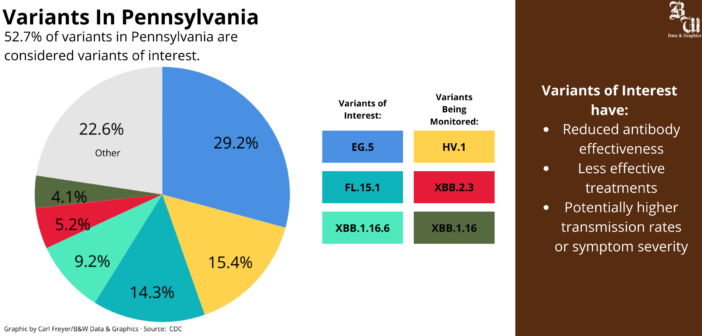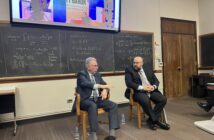The Centers for Disease Control and Prevention recommends individuals over 6 months old should get a regular COVID-19 booster shot to fight against variants of the virus. However, there are many questions regarding the effectiveness of the vaccine as well as insurance issues for those who lack proper access to healthcare.
The Food and Drug Administration authorized the emergency use of the adjuvanted Novavax COVID-19 Vaccine on Oct. 3, voiding the previous version of this vaccine’s authorization for individuals 12 years of age or older. The adjuvanted version of the vaccine has a new formula to better target the Omicron variant.
According to the Children’s Hospital of Philadelphia, adjuvants are chemical substances added to vaccines to improve their immune response.
It is recommended by the CDC that those who have not been vaccinated for COVID previously should receive two doses of the updated Novavax vaccine, whereas those who have previously been vaccinated should receive one dose. Those who are immunocompromised should receive at least one dose, they wrote.
There is still an option, however, to receive the mRNA vaccine from Moderna or Pfizer-BioNTech instead.
Lawrence Tartaglia, a biology professor specializing in virology at Lehigh, said the purpose of vaccinations, in general, is to introduce a foreign antigen from an intruder into the body to mount an immune response against it.
Though he said the vaccine has been effective in preventing severe illness related to the COVID virus, specifically by targeting the spike protein antigens on the surface of the virus, the protein has evolved so antibodies can’t bind as effectively to battle the virus.
“Vaccines are naturally going to become less effective to some degree because there’s a lot more pre-existing immunity that exists now,” Tartaglia said. “It is hard to find someone that hasn’t been infected.”
Tartaglia said it’s important researchers continue to develop vaccines based on circulating variants. As variants change, the previous vaccine will become less effective.
In regard to vaccinations being required on Lehigh’s campus, Steven Bowers, medical director of the Health and Wellness Center, and the COVID Response Team decided a COVID booster vaccine would not be required for students.
“The issue became more trying to track who had the initial series, who had boosters (and) who needs additional,” Bowers said. “That process alone is very labor intensive.”
He said after three years of COVID, people who were going to get the vaccine have already gotten it, and the people who haven’t had the vaccine have likely already gotten the virus, so the COVID Response Team agreed most people have some protection.
Bowers said trying to mandate a booster would be different from when the pandemic started.
“I think people are frustrated because they get the vaccine and the booster and they still end up getting COVID,” Bowers said. “But that’s not the point of the vaccine.”
He said the main premise of the vaccination is to keep people out of the hospital and to keep people from dying from the illness.
Similarly, the flu vaccine is not 100% effective, Bowers said.
On a good year, he said the flu vaccine is 40-50% effective, but it works to keep people out of the hospital.
Rose Denommee, the captain of Lehigh University Medical Services, has experience working in a hospital and said she has seen insurance issues and vaccination problems firsthand.
“People sometimes say ‘I don’t want to take an ambulance ride because I don’t have insurance, and it is too expensive,’ and as a provider that really hurts my heart,” Denommee said. “What can we do to make healthcare more accessible in America?”
Denommee said there have been free COVID vaccines available at pharmacies, dependent on information requested such as demographics, medical history and housing, but otherwise the vaccines are covered by most insurance.
She said while the COVID vaccine is readily available, many individuals lack knowledge on its importance.
“We are not properly educating the non-healthcare professionals,” Denommee said. “It is hard to explain what an immunization is to someone who does not have a foundational understanding as to why it is important.”
Tartaglia thinks the boosters can particularly be helpful for the most vulnerable individuals in preventing severe illness.
“Although we are living in a time much different than a few years ago when (the) pandemic was raging and hospital beds were filled with sick and dying patients, the boosters are still a good idea as they are designed against some of the recent circulating strains,” Tartaglia said.
Denommee said the autonomy of a patient is highly important, and if an individual is immunocompromised or surrounded by those who are, she recommends receiving the booster. She said healthcare providers should also consider receiving it, as they are often the ones in high-volume areas of illness.
When it comes to the next steps in actually getting the vaccine, Bowers said boosters can be accessed at local pharmacies and should be in stock at this point.
Denommee also said both Rite Aid and CVS offer the booster in the local area.
“I think there may be some individual decisions among those who are not at high risk for serious disease,” Bowers said. “But if you are elderly, immunocompromised or have medical conditions that make you more susceptible, you should definitely get the vaccine.”






Comment policy
Comments posted to The Brown and White website are reviewed by a moderator before being approved. Incendiary speech or harassing language, including comments targeted at individuals, may be deemed unacceptable and not published. Spam and other soliciting will also be declined.
The Brown and White also reserves the right to not publish entirely anonymous comments.